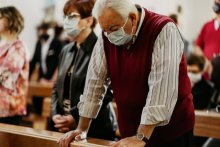
The COVID-19 pandemic has been a period of acute stress for many people. Pastors and Christian congregants—who are to set their minds “on the things that are above, not on the things that are on the earth” (Colossians 3:2)—have not been exempt. Community, fellowship, the coming together of people, and sharing together in one another’s lives are important in Christian living. Many Christians took (and still take) exception to governments enacting restrictions on gatherings and preventing them from meeting together for worship. This, in turn, has led to divisions within churches.
When the world is in crisis, it is the best time for Christians to show the world how they are different: how they are not swayed by earthly factionalism or governed by fear. There have been countless such wonderful examples all over the world over the past year and a half. But, dare I say, this has not been the case everywhere. Sadly, many have let their political views, fears, and pride govern their words and actions.
I want to begin with an example, being fully aware that I am making myself a target of Paul’s rebuke in 1 Corinthians 3:1–9. Praise God whenever and wherever the gospel is faithfully preached! But some such pastors also say things which make me question their sincerity for the gospel, and which even makes it difficult for me to respect them. One such person is John MacArthur, a high profile and much beloved pastor in California. Last year, MacArthur defied a state ban on indoor gathers during a COVID-19 lockdown. MacArthur, like many other Christians, does not believe that the State has (or should have) authority to dictate to churches. His defiance struck me as odd: as church attendance has been dropping in the USA between successive generations for more than 50 years, it seems likely to me that MacArthur would have many older people in his congregation. The older a person is, of course, the more likely they are to die from COVID-19. MacArthur’s defiance could, therefore, be to their detriment. (And what not to say of the well-being of the people with whom those congregants come in contact during the week.) It seems to me that, to John MacArthur, it is more important to be anti-authoritarian than to look after the well-being of his congregants.
In addition to some believers being defiant of the state (while others wish to comply), I have also seen how the issue of mandatory wearing of masks has been tearing churches and Christian communities apart. Yes, the state mandates the wearing of masks, but the state is not omnipresent; they do not see what goes on inside a multitude of small churches. There are individuals who truly feel anxious during this time when they see other people not wearing masks. And so the conflict quickly turns into one between individuals and factions within a church; so much so that some may feel that their only recourse is to call the police on their own brethren because of their non-compliance with wearing masks.
This is, of course, not how conflicts within churches should be settled. At the same time, people have different reasons for not wanting to wear a mask to prevent the spread of COVID-19, but I suspect that most of these objections are rooted in simple defiance: how dare some people tell me what I should and should not do?! They do not take it seriously that these precautions are for the safety of others: it is a matter of bodily autonomy and as morally bankrupt as the pro-choice Violinist thought experiment.
Government Oppression
To be frank, I am amazed at the suspicion people have towards their governments over lockdown regulations. Many people suspect a nefarious conspiracy theory and forgo the obvious and plain reading of the situation: that governments, whether competently or incompetently, are trying to save lives while also balancing the economic needs and requirements of their people. When a government bans or imposes limits on the gathering of groups of people across the board, the intention is to prevent the spread of the disease. Lockdowns and restrictions on church gatherings are not persecution.
I believe that the vast majority of states (whether South Africa, the USA, the UK, or most other countries in the world which have implemented restrictions on people meeting together, even religious gatherings) implemented restrictions on religious gatherings in good faith. In trying to limit the spread of a pandemic (as best as they know how), governments need the cooperation of everyone. If everyone is not willing to cooperation (it never is across an entire population), then coercion through rules and law enforcement is the only option they have left.
But do governments have the authority to restrict church gatherings? While this seems like an important question to ask, this is the wrong question to ask. This is a question for theologians, philosophers and political theorists when there is not an ongoing pandemic. While there is an ongoing pandemic, the question should be, why aren’t churches cooperating with governments to the maximum extent to try and protect and save as many lives as possible? Many churches have done incredible work in setting up feeding schemes for people who lost their jobs or otherwise could not work and earn money during lockdowns. These were wonderful displays of the church’s calling to further the Kingdom of God! But churches can also help in much simpler ways: to curb the vile effects of the pandemic by temporarily not meeting together, or being physically distanced, or wearing masks. These are things people within the church—when having an eye on the needs of others—should do out of themselves! By the time the government puts lockdown restrictions in place, the church should be saying “we are coming alongside you to help others and prevent loss of life”.
But instead of allowing ourselves to be put out and inconvenienced, we immediately accuse the government of being controlling and wanting to enact persecution.
What an affront it is to our brothers and sisters in Christ who are currently jailed and being executed for their faith when we cry “persecution!” over government mandated face masks! What a disgrace when we complain about having to cover our noses and mouths with a mask while other Christians elsewhere in the world are wearing masks to worship, not because their government mandated it for safety reasons, but to avoid the surveillance of a government who will imprison and torture them for gathering with their fellow believers!
Shame on anyone in the West who has used the pandemic to claim persecution!
“But,” you say, “government control over our worship is the beginning of persecution! Next they will ban it completely and throw us in jail!” That is all good and well. If and when it happens, then we may call it persecution. Anyone can then gloat to me that they were right and I was wrong. However, I am not presently seeing persecution around me, and I refuse to demonise the government for something conjured up by conspiracy theorists who have no evidence for their claims.
Persecution is not a good thing. But it is also not the worst thing1. It keeps one humble and focused on what is important. Many early Christians desired to suffer persecution so that they could come out on the other side of that crucible more refined. Throughout history, and even today, many Christians feel that persecution keeps them sincere, instead of becoming “soft” and entrapped by this world. If that does not sound appealing to you and like something you want to avoid at all cost, then I want to suggest that your biggest problem is not arguing with people in church about whether or not masks should be worn during worship.
An Attack on Personal Autonomy
Not everyone sees lockdown regulations as the start of persecution. But they do find them to be terribly inconvenient: to the point where they refuse to comply.
“A mask makes it difficult for me to breathe.”
“Wearing a mask fogs up my glasses, then I cannot see.”
“If you wear a mask, you are not trusting that the Holy Spirit will keep you safe.”
These are all things I have heard people say, and each one left me shaking my head. I do not think I can address this point any more succinctly that this tweet:
If wearing a mask on public transport (or in public places where it’s required) doesn’t harm you, and it makes your neighbour feel more loved, then even if they don’t work,* why would you resent wearing one?
#lovethyneighbour
*they do work
Again, I have to ask (and this is a difficult thing to do), but if we deconstruct our reasons for not wanting to wear a mask (in this time of an actively ongoing pandemic), what lies at the very foundation other than pride and a rebellious spirit? Is making “your neighbour feel more loved” at the heart of refusing to wear a mask?
A time will come when the pandemic has passed and people can meet together without reasonably expecting people to get sick. At such a time, wearing masks won’t be necessary. Some individuals may be anxious about that, and then their anxiety will need to be addressed: society cannot be held captive by hypochondria. But that time has not yet come. While people are still dying from COVID-19 (and they still are), it is the loving thing to do to be diligent and conduct yourself in such a way as to take the concerns of other people into account, even at the expense of your own comfort.
Conclusion
How amazing is it that we can take our fears and anxieties—whether about getting sick or being persecuted—to our loving Father, the mighty creator of the universe?
Come to me, all you who labour and are heavily burdened, and I will give you rest. Take my yoke upon you, and learn from me, for I am gentle and lowly in heart; and you will find rest for your souls.
Matthew 11:28–29
If only we would actually take up Jesus’s offer! Instead, we end up bickering and becoming discontent with our brothers and sisters, or launch into unwarranted rebellions against the state, rather than focussing our attention on coming alongside them to help those in need. For all the beauty and good that we have seen, the current pandemic has revealed much ugliness amongst Christians. May the Lord be merciful on us as we pass through this crucible, allowing us to extend much grace to one another, serve the vulnerable, and in the end come out on the other side appreciating His Kingdom all the more!
- 1. Christians in China are heavily persecuted from time to time, and are going through a wave of persecution at the moment. But some of them do not pray that their persecution will end. They know that, without persecution, many Christians have grown lax and lukewarm. It is more important for them to not become like that than to not be jailed and discriminated against.







Latest comments